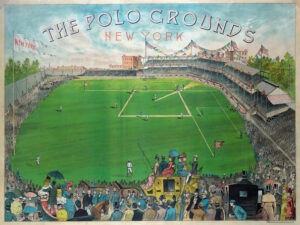
The Los Angeles Lakers are aptly named for the many lakes that polka dot the landscape of Southern California. Now is the point in the article where we pause and reflect on the complete untruth of the previous sentence. While Los Angeles does have its’ fair share of lakes, it is not something that the City of Angels is typically known for. So how did the Lakers come to be called the Lakers? Well, that’s simple. They were originally named the Lakers when they were located in Minneapolis. That’s right. The Los Angeles Lakers were born in the Land of 10,000 Lakes. Now it all makes sense.
“But this is a baseball website,” you say.
You are correct and that is why we are shifting gears to a more appropriate subject, no offense to the Lakers or the NBA.
How the Giants Became Giant
As many of you know, or possibly don’t, the San Francisco Giants followed a parallel path to that of the Lakers. They were born in one city and moved to another for financial reasons. And while tracing the origin of the Lakers’ name is easy, the Giants’ name journey is a little muddier. If the Giants, who were originally from New York, were called the Apples instead (New York=the big apple) that might make a little more sense. But Giants? Was there a race of large people living in New York before the city was founded? Surely not. At least there are no living breathing giants in New York to be found in the known history books.
Possibly Giants is in reference to the many large skyscrapers in the city? The answer is no again. The Giants, who were initially called the Gothams in 1883 and 1884 changed their name to the Giants in 1885. The first skyscraper in New York City, The Tower Building, wasn’t fully completed until 1889. Strike two.
So where did the name come from?
Mutrie or Donahue
The New York Gothams had finished sixth (out of eight teams) in the National League in 1883 with a 46-50-2 record. In 1884 the Gothams faired a bit better, finishing fourth with a 62-50 record. Going into the 1885 season, New York had high hopes. They had consistently improved and had six future Hall of Famers, including John Ward, Buck Ewing, and Jim O’Rourke. The offing looked bright and refulgent it would prove to be. And after a comeback victory against the Philadelphia Phillies, Gothams’ manager, and co-founder, Jim Mutrie, was feeling pretty good about his boys, and stated “My big fellows, my giants!” and the name stuck.
But was Mutrie the first to–or did he ever–say this? There is written evidence to the contrary that the team name was coined by P.J. Donahue, a well-known sportswriter in New York, prior to the 1885 season. And there is nothing, other than Mutrie’s word, that he did say “My big fellows, my giants!” In the April 14, 1885 edition of the New York Evening World, Donahue wrote (although there is no byline, it is suspected to have been written by Donahue) a piece about a pre-season game that the Gothams played against a Jersey City minor league team. In his write up he calls the Gothams “Giants”. And very shortly after the publication of the article the name caught on and was used regularly about the soon-to-be-former Gothams.
Signs
While all signs point to the Evening World article as the true origin of the Giants’ name there is still some uncertainty behind the stories. As with many things in baseball, as well as life, there is a tinge of mystery, which is just how it should be.
Main Photo:
Embed from Getty Imageswindow.gie=window.gie||function(c){(gie.q=gie.q||[]).push(c)};gie(function(){gie.widgets.load({id:’akiPF7YBQjxn7UWk-CvGjA’,sig:’3nuEjbl6AQy5KrXlNO6OjyNjW38IT-nwJ9rXAR942cU=’,w:’594px’,h:’446px’,items:’566422119′,caption: true ,tld:’com’,is360: false })});
Players Mentioned:
John Ward, Buck Ewing, Jim O’Rourke
The post How the Giants Became Giant appeared first on Last Word On Baseball.